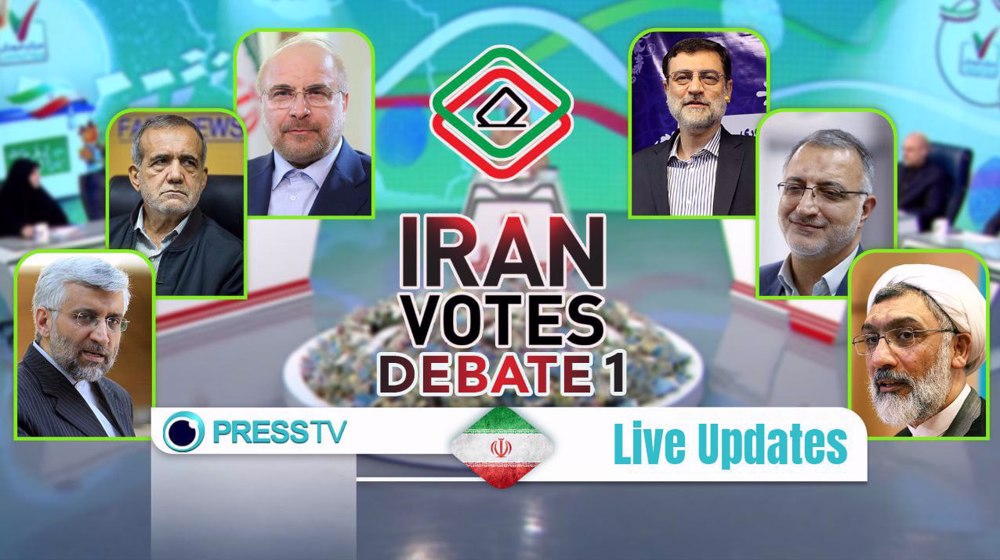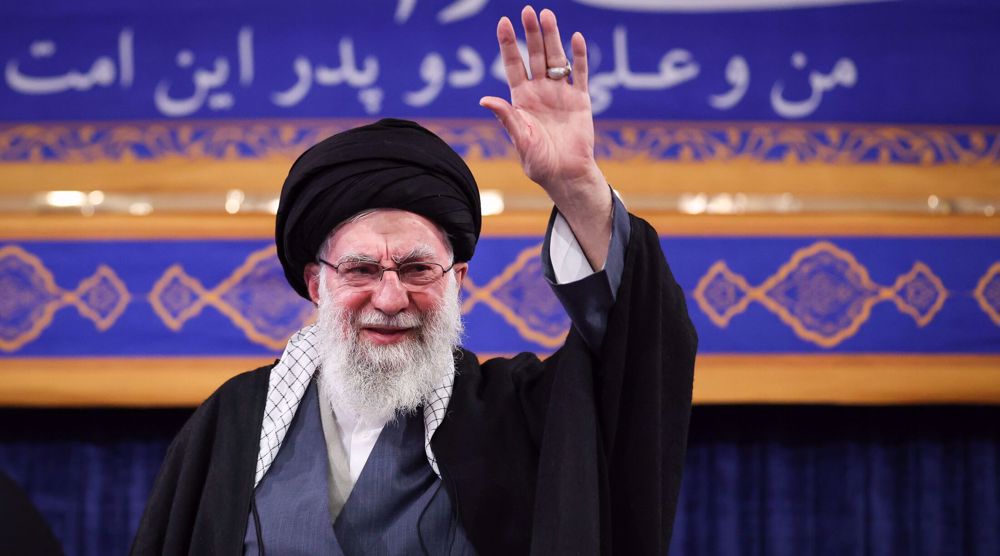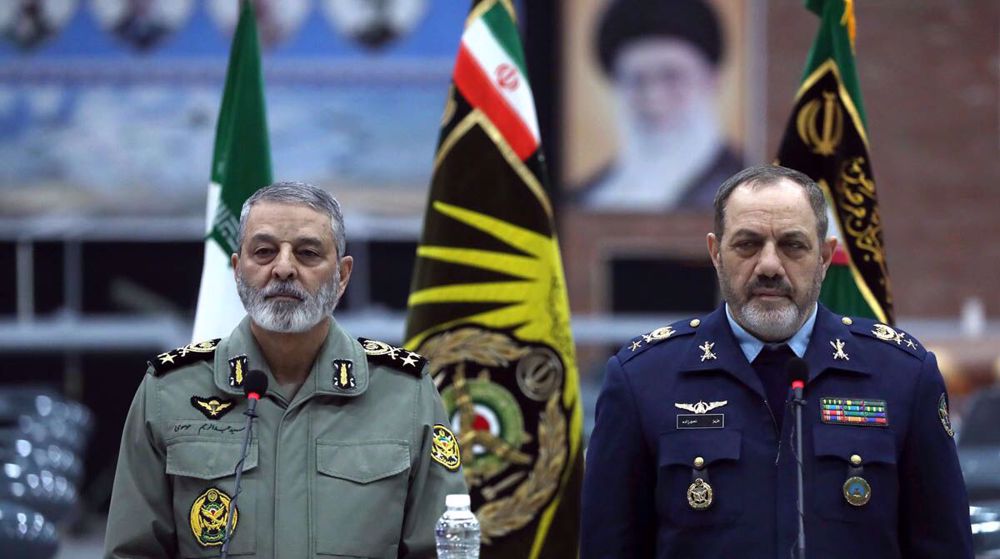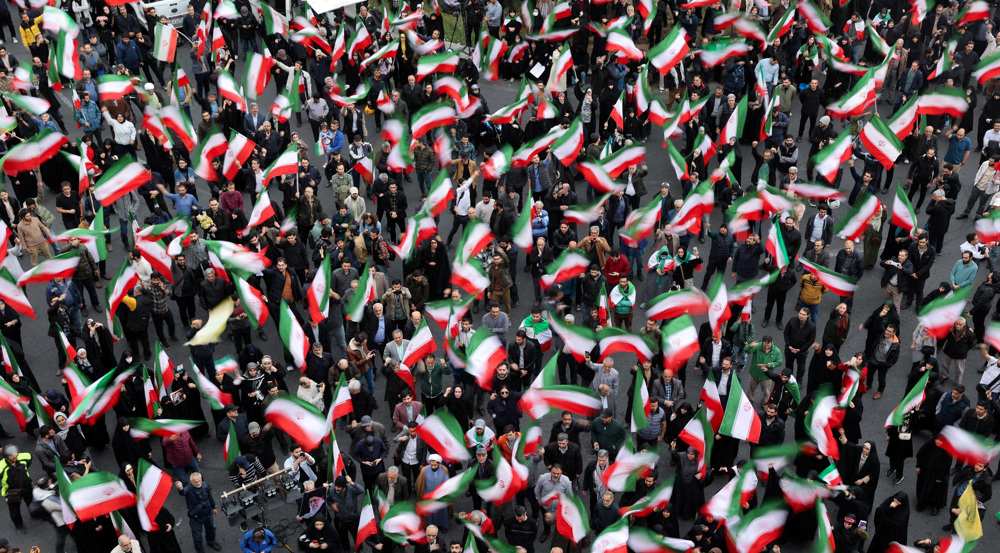Highlights: First debate in 2024 Iran presidential election
The six candidates vying to become Iran's next president face off in the first televised debate on Monday, presenting their plans on how best to revive the economy.
The contenders are laying out their economic platforms, offering a range of proposals aimed at addressing high inflation, sanctions, investment, and other economic issues and challenges.
The hopefuls continue to trade barbs and criticisms, each trying to position himself as the best candidate to tackle Iran's economic woes.
🔴 LIVE: Presidential candidates take part in 1st televised debate hosted by Iran's national broadcaster IRIB#IranVotes2024 https://t.co/eHHtZtkFgy
— Press TV 🔻 (@PressTV) June 17, 2024
Pourmohammadi:
The country needs these discussions. I hope it leads to widespread voter participation (in the presidential election) as that is the key to our (national) strength.
The main goals must be measurable, with necessary control and oversight, while being accountable to the people.
The government's duty is to ensure security and provide a life of comfort and tranquility to people.
The government should invest in infrastructure so that people, private sector and cooperatives can make the most of these investments.
Attention must be paid to main infrastructures, especially the communication and electronic networks, which should be developed and made affordable. We should utilize modern economic engineering in running the country.
Achieving our (national) goals requires consensus and a unified discourse on the international stage.
Governing a country is not akin to the management of a hospital or a research institute. It encompasses the capacities of an entire civilization, culture, and history.
We need expert opinions (to govern the country) and must act with experience.
Zakani:
The country needs a manager who is both honest and capable of fighting corruption, as well as being effective in his work.
In my opinion, for the country to move towards prosperity and well-being, expert work is necessary.
We (the previous government) signed a memorandum of understanding with China worth 13 billion euros. Mr. Farzin said it was unprecedented in the history of the Islamic Republic.
Jalili:
In the next four years, the (next) president must not only solve routine problems but also propel the country forward. He must understand the root causes of problems.
There must be serious financial discipline in the country's economy. Everyone should be involved in the effort, not just those benefiting from privileges.
We are in a unique historical position. We can have extensive foreign interactions.
Pezeshkian:
I never said we should bring in managers from abroad. I said we should bring in advisors.
My life is based on honesty, and that won't change. The country is not to be run through conflict and disputes.
I support social justice, not populist slogans. I will place the government's treasury in a completely transparent place.
Let us join hands because the Islamic Republic of Iran needs coordination and unity. Leader of the Islamic Revolution's general policies are our path forward.
Qalibaf:
People of Iran have the opportunity to make the world envy our progress with their choice (in the upcoming election).
Government's involvement in the economy should be minimized. People are the foundation of economic transformation. Scientists and elites can create change, and the government must allow them to make decisions for it.
In the government of 'service and progress', we need to create a protective shield for at least five income categories of society, which includes household goods, livelihood, and essential goods. With this shield, we must prevent damage until inflation is controlled.
The Islamic Revolution gave people the opportunity to govern their destiny with religious democracy.
Qazizadeh Hashemi:
The government was handed over to Martyr President Raeisi with an empty treasury, but it was managed well (by his administration).
Sanctions increased, but our oil sales also rose. President Raeisi made it happen.
In September 2021, the inflation rate was 46 percent, but it dropped to 37 percent by May 2024.
We experienced a decade of negative economic growth, but during President Raeisi's tenure, the average growth reached 6 percent.
Pourmohammadi:
We have to play in big fields and not be afraid of failure. Nations should have big goals and it doesn't matter if they fail because not everyone can be successful all the time.
We must return the ownership and management of stock market to people.
The economy of resistance is central to (my) government's (economic) discourse.
Zakani:
It is wrong to entrust work to experts and become indifferent about the performance.
Jalili:
Inflation, especially in recent years, has been caused by high exchange rate. Whenever the exchange rate goes up, it affects (rates of) goods.
Our detailed review shows there are a set of measures in the process of controlling the currency market. We have prepared it and will implement from day one (of new government).
If the currency market is managed (by the government), inflation will be (automatically) controlled.
Pezeshkian:
Governments are the main cause of inflation. Expanding the (size of) government is the most important cause of inflation.
We must use the experience of other countries (in resolving economic issues).
Qalibaf:
In inflation, the first thing we should pay attention to is budget and its structural reforms.
When we write the budget, we call it the government budget. The budget is not the budget of the government, the budget is the budget of people's lives.
I did not say that we (the parliament) gave independence to the Central Bank of Iran. We gave it authority.
The Central Bank of Iran must stand firm and deal with forces that create money and put pressure on people.
Ghazizadeh Hashemi:
We must prevent the interference of irresponsible persons in banking institutions.
We became an example in the world for improving productivity during the government of President Raeisi.
The fact that we have stability in the currency market today is due to political authority. Even though we had tension with the enemy armed to the teeth, but we still managed to control the exchange rate.
Pourmohammadi:
You can't entrust big things to weak people.
The president should not only be a strong manager. He must have the power of cohesion, trust building and people must believe in him in order to gather strong forces around him.
Inflation and liquidity have common roots. Inflation can be reduced by controlling liquidity.
Zakani:
We must speak clearly so that people can choose (who will be their next president).
If we want people to have political participation, we must make people participate in the economy.
Banks are the main cause of inflation. Along with the bank, governments are agents.
Instead of subsidies, we should give gold credits to people. Subsidies should be given in energy without changing the price.
Jalili:
The (incoming) government should be able to fix the imbalance between the bank and the (country's) budget.
On the issue of inflation, the first point is the sovereignty of rial, which means the government should know how money circulates and moves in the economy in order to manage and govern it.
It must be clarified that the money that banks create from people's pockets is going in which direction. Money cannot be created from people's pockets and spent for the benefit of few.
Pezeshkian:
I did not say the stock market problem will not be resolved, but it will not be resolved in three days. It will not be resolved even in one year.
President Raeisi worked round the clock and we appreciate his relentless efforts for the country.
Inflation means emptying people's pockets. People sleep at night and in the morning they find their purchasing power has decreased.
Qalibaf:
We must put in place a protective shield for people against inflation
Private banks and sometimes state banks used to create money. In the new (parliamentary) law, we returned the authority to the central bank to supervise banks.
Today most of our (economic) problems in the country are rooted in imprudence in creating policies.
Ghazizadeh Hashemi:
If it's left to us, we can solve the problem of stock market in less than 3 days. The concept of stock market is based on expectations. Who razed it to the ground before the government of President Raeisi.
If wrong policies are corrected, the stock market will be set in order.
All experts believe that inflation can be (returned to) single digit. There exists a practical solution to the issue.
In the three years of the previous government (led by President Raeisi), may good works were accomplished.
A total of 2.4 million housing units are currently under construction, not 300,000.
Pourmohammadi:
I tried to solve people's problems (while serving as a minister) in different administrations.
We must use previous experience as criteria (for assigning managerial roles). Internal self-imposed sanctions, which are complementary to external sanctions, should be resolved tactfully.
Zakani:
The problem is that we listen to the people, but our behavior and actions are not complementary.
Diplomacy is successful when we solve people's problems inside the country and people will stand behind us.
Jalili:
People are faced with a choice between two perspectives, one is an everyday option and the other is an opportunity to leap forward.
The academics have the right to play a role in the country's (economic) growth.
Our villages have the capacity to contribute to the country's growth. People (in villages) should trust and invest in the capital market.
We have 40,000 villages with more than 20 households, each of which can be a cell for a leap forward.
Pezeshkian:
I was the only candidate after registration who said he would implement the policies enshrined in the Seventh Development Plan.
Ghazizadeh Hashemi:
Show us an example of a developing country that grew on the recommendations of the World Bank. The World Bank's vision does not accept the concept of humanity, it says that employees should be paid based on productivity.
We believe in global experience, but both successful experiences and failed experiences.
If you cannot comply with the Seventh Development Plan and you know it is very difficult, why did you become a candidate for the presidential election?
The government should not compete with the people, this is against the strategic policy.
Qalibaf:
If we do not remove self-imposed sanctions inside the country, it is not possible to follow the issue of lifting sanctions outside the country.
I was in Tehran municipality for 12 years, I didn't have the necessary support from the government, but I built 170 kilometers of metro (in the city).
We should use the capacity of the Shanghai Cooperation Organization and agreements reached.
Pourmohammadi:
I believe we can solve the problems with reliance on national capabilities and expertise, with the help of experts.
The numbers serve as evidence. We must speak with numbers. Ambition alone does not work.
We are forced to succumb to liquidity and inflation.
How can we create stability in the midst of this turbulent sea of inflation?
We cannot just speak, the numbers are screaming and showing themselves.
Zakani:
The government should be active, thoughtful, facilitating and complementary. This lends meaning to the sovereign state. The powerful government is not against the people.
Sanctions must be neutralized; After that, diplomacy must.
Jalili:
What is important is what approach is going to be used to govern the country.
President Raesi's government did many things that they said could not be done.
Privatization is to increase productivity, not for the government's small income.
If someone comes to invest and does not have required qualifications, we will definitely not get results.
This is an election and people can choose which government will come to work.
Pezeshkian:
If management is improved, cost issues will also be improved
We are providing money but we don't pay attention to results. Why should we entrust management (of our public affairs) to those who incurs losses.
When visiting a doctor, we look for an expert doctor, not a doctor of our own faction.
Economic issues won't be solved with slogans. It can be done only with expert work and using the experience of the world. Brains are fleeing and funds are also fleeing.
Qalibaf:
To achieve an 8 percent economic growth, in my opinion, productivity takes priority over investment.
Mr. Pezeshkian rightly said we don't have currency for importing used cars; but I must say, last year $8 billion were allocated for importing used cars.
In the seventh development plan, Article 8, the government is obliged to transform one of the specialized banks into a development bank where liquidity is transferred and spent on infrastructure and production projects.
The diplomatic apparatus (of the country) should pursue the (issue of) neutralization of sanctions.
Qazizadeh Hashemi:
I consider myself committed to the programs of President Raeisi's government.
Privatization must be competitive and transparent, with the stock market as its tool.
The government should not compete with the private sector; the private sector is a strategic partner of the government, and the government should support its development.
The government is a major foundation for investment but should not monopolize.
Pourmohammadi:
We have accomplished great tasks, but we must also recognize the weaknesses.
Are the problems only with the executives? Perhaps the programs have issues. Is 8 percent growth really feasible to implement? Maybe the program is not executable.
Until we build trust, people will not invest, and we will not have economic growth. It is not possible to deal optimistically with issues.
National capability has enabled us to withstand crippling sanctions.
Zakani:
Pezeshkian made general statements and in the end said it's not possible. I wonder how he became a presidential candidate.
Fundamentally, inflation is not bad. The key is to prevent inflation from becoming erratic and to invest capital in suitable places.
Jalili:
Understanding opportunities is essential for achieving the eight economic growth plan. If we say achieving 8 percent growth is possible, it requires us to see the opportunities.
The policy of maximum pressure (that US executed against Iran) failed with planning, understanding opportunities, and attracting investments.
The same people who said they wouldn't negotiate with us came and made long-term agreements with us.
If our focus is merely on weaknesses and we fail to see the opportunities, we cannot achieve success.
For investment, you must have a prepared package of permits so that individuals within your administrative structure do not get stuck.
Without a precise and proper framework, exporters and importers will face problems. Exporting and earning foreign currency should become a mission for all agencies.
The president must identify shortcomings and problems, as well as recognize opportunities to help the country grow by addressing these shortcomings.
Pezeshkian:
It's impossible to have a proper trading partner in the world with these sanctions.
No country has had economic growth without export growth since World War II.
Buying second-hand foreign cars has become an honor for us.
With incorrect technologies, we are losing underground reservoirs.
The inflation rate is at 40%, while wages increase by 20%.
Qalibaf:
The most important issue of the seventh development plan is family-centeredness.
Mr. Pezeshkian mentioned that there should be cohesion in all areas, I agree with that.
When we talk about investment, it is partly related to investment itself and partly to productivity.
We have not made the economy predictable. Two days ago, a ministry made a decision that caused an outcry.
Qazizadeh Hashemi:
The cost of our wrong (economic) decisions is paid by the people.
Our economy is unpredictable. It needs to become predictable. We should not make decisions at the expense of exporters. We should not ban the import and export of tomatoes one day and onions the next. We need to stop causing economic hardship for people.
We need to invest in creation of joint industrial parks with foreigners and neighbors. Economic policy should boost production and benefit (Iranian) households.
We sell crude oil and buy cooking oil. Knowledge-based companies can produce the same.
Mostafa Pourmohammadi:
Economic problems do not solely have economic solutions. The economy is interconnected with culture, society, legal, political, and international issues.
Some used to say that sanctions are not a significant issue. Now they say they impact our economy by 20-30 percent. When all our trade and financial relations are locked, how can economic actors operate?
We must work with the world and meet the needs of our people.
Alireza Zakani:
Iran's economic problems are not related to sanctions but the economic prescriptions of the United States.
Firstly, we must emphasize economic stability based on de-dollarizing the economy and relying on our national currency. Secondly, we should pursue a production leap focused on product-oriented production. Thirdly, we must accept the governance of the people in the economy. And fourthly, we should prioritize wealth creation.
We need to de-dollarize the economy. The problem with the economy is that people earn in rials but, due to the path we have set, spend in dollars.
Saeed Jalili:
An 8 percent economic growth is essential today, and people must be able to choose who can achieve it in the best way
Linking growth solely to capital is not sufficient. Growth has various factors, one of which is capital, but managing this capital is more important.
If our national consensus is to achieve 8 percent economic growth, we must have 48 programs that the seventh development plan requires from the government.
An 8 percent growth can be realized only if we have a plan for it starting the day after the elections and recognize the country's
Masoud Pezeshkian:
With the current forces and experts, the seventh development plan (of the country) is not feasible.
If we cannot ensure internal cohesion and participation of all political groups in the implementation of programs, the seventh development plan will not be executed properly.
The government, along with experts, must formulate a proper plan and review the goals again.
For 8 percent annual economic growth, we need $200 billion, which is not possible under current conditions.It is impossible to achieve 8 percent economic growth without opening borders with other
Mohammad Baqer Qalibaf:
The most important duty of the president is to bring about economic transformation
The president must be chosen in a way that ensures the resolution of problems.
The seventh plan was a joint program of the parliament and the thirteenth government and is the only national covenant of the country.
In my administration, salaries will increase in line with inflation and economic growth.
Ghazizadeh Hashemi:
Making promises causes people to believe everything, and if promises are not fulfilled, people become disillusioned with the ballot box. People are really tired of promises.
Let’s not speak as if the world started today, and we should not criticize the past without considering our own roles in it.
I am the youngest candidate and have 20 years of executive experience in the country.
Profile: Maj. Gen. Abdolrahim Mousavi, the martyred Chief of Staff of Iran's Armed Forces
Profile: Major General Mohammad Pakpour, the martyred IRGC commander-in-chief
Iran’s government declares 40 days of mourning over Leader’s martyrdom
American criminals and Israeli regime will 'regret' war of aggression against Iran: General Staff
Iran’s defense minister, chief of staff of armed forces assassinated in US-Israeli strikes
Pezeshkian condemns ‘savage’ US-Israeli attack on school that killed nearly 90
Islamic Jihad extends 'full solidarity' with Iran following Israeli-American aggression
Leader of the Islamic Revolution martyred in cowardly Israeli-American aggression










 This makes it easy to access the Press TV website
This makes it easy to access the Press TV website